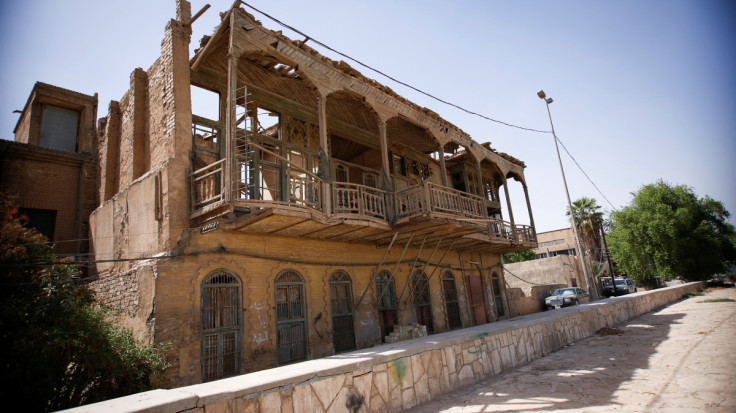Baghdad's Historic Homes Crumble As Real Estate Booms

Overlooking the Tigris river in Baghdad, a 100-year-old Iraqi mansion stands dilapidated and neglected. Visitors hoping to catch a glimpse of its faded glory are warned off by a sign near the door saying: "Danger of collapse".
The 16-room building once boasted latticed windows, delicate carvings, a balcony and an inner courtyard dotted with fruit trees.
Now, like many of Baghdad's roughly 2,500 remaining historic houses, it is falling apart. Decades of political turmoil, neglect, soaring real estate prices and a lack of funds have taken their toll on the buildings which are part of the city's architectural past.
"This is one of the most important remaining heritage houses," said Dhikra Sarsam, founding member of the Burj Babel Initiative which works to preserve the Iraqi capital's cultural history.
Built about a century ago, the house was left in disrepair for years, one of its owners, civil engineer and consultant Faiz Falih al-Qassab, told Reuters.
He said that the area where the house is located was chosen as the site for an opera house under former president Saddam Hussein and up until 2015. No renovations were allowed during that time, but the opera house was never built.
"Now it is too late to renovate," he said from his home in neighbouring Jordan, where he has kept old pieces of furniture rescued from the Baghdad house.
From her own home just next door to the historic house owned by Qassab, Sarsam works to raise awareness of the need to preserve old Baghdad.
Owners of listed buildings are not allowed to demolish them, and the government can provide loans or grants for renovations, if needed. But the government "is not committing to this at the moment," Sarsam said.
"There is unfortunately no budget allocated to support owners," Mohammed al-Rubaye, the head of media and public relations at the Mayoralty of Baghdad told Reuters.
With the help of UNESCO, the government last year renovated al-Mutanabbi street, a Baghdad landmark which bustles with booksellers and artists. But residential alleyways nearby are dotted with crumbling homes and "shanasheel" - traditional balconies with ornate woodwork - are falling apart.
To circumvent the ban on demolishing listed buildings, owners sometimes flood or set fire to them, Rubaye said.
The motive is clear - Baghdad real estate prices are high and selling land for development is profitable.
The relative stability in Baghdad in recent years and the recovery in oil prices since the outbreak of the COVID-19 pandemic in 2020 have provided a positive backdrop for the real estate market in the city.
Sarsam sometimes receives calls from neighbours worried about a potential demolition, and rushes to the site.
As she walks past the ruins of a 1930s mansion in Baghdad's Abu Nawas street, which runs along the eastern bank of the Tigris, Sarsam points at traces of fire darkening its crumbling interior walls.
"It surely did not collapse on its own," Sarsam said. After she contacted authorities, they stopped it from being demolished and cordoned off the building. But its fate remains uncertain.
"This is a huge loss for the history of Baghdad. With each house collapsing, Baghdad also loses a piece of its identity," she said.
Copyright Thomson Reuters. All rights reserved.





















